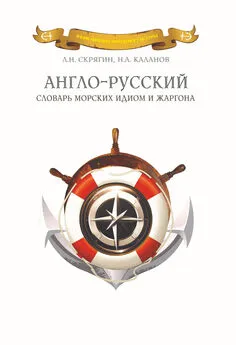Adam Makkai - Словарь американских идиом: 8000 единиц
- Название:Словарь американских идиом: 8000 единиц
- Автор:
- Жанр:
- Издательство:неизвестно
- Год:неизвестен
- ISBN:нет данных
- Рейтинг:
- Избранное:Добавить в избранное
-
Отзывы:
-
Ваша оценка:
Adam Makkai - Словарь американских идиом: 8000 единиц краткое содержание
Это обновленное и дополненное издание, содержащее более 8000 идиоматических
слов и выражений, причем каждое из которых снабжено грамматическим объяснением
и практическим примером. Словарь содержит лексемные идиомы, фразеологические
единицы и поговорки, имеющие особенное значение. В нем приведены наиболее
употребительные выражения только американского английского языка. Этот словарь — идеальное пособие для студентов, часто разъезжающих бизнесменов и просто
путешественников.
Словарь американских идиом: 8000 единиц - читать онлайн бесплатно полную версию (весь текст целиком)
Интервал:
Закладка:
[hit the deck] {v. phr.} To get up from bed, to start working. (From sailor’s language as in "All hands on the deck!") •/ OK boys, it’s time to hit the deck! /
[hit the dirt] {v. phr.} , {slang} , {military} To take cover under gunfire by falling on the ground. •/ We hit the dirt the moment we heard the machine gun fire. /
[hit the fan] {v. phr.} , {informal} To become a big public problem or controversy. •/ The whole mess hit the fan when the judge was arrested for drunken driving for the second time. /
[hit the hay]or [hit the sack] {v. phr.} , {slang} To go to bed. •/ The men hit the hay early, in order to be out hunting at dawn. / •/ Louis was so tired that he hit the sack soon after supper. /
[hit the high spots] {v. phr.} To consider, mention, or see only the more important parts of something such as a book, war, or school course. •/ In his lecture, the speaker hit the high spots of his subject. / •/ The first course in general science hits only the high spots of the physical sciences. / •/ The Bakers went to the fair for one day, and only hit the high spots. /
[hit the jackpot] {v. phr.} , {slang} To be very lucky or successful. •/ Mr. Brown invented a new gadget which hit the jackpot. / •/ Mrs. Smith hit the jackpot when she got Lula for a maid. /
[hit the nail on the head] {v. phr.} To get something exactly right; speak or act in the most fitting or effective way. •/ The mayor’s talk on race relations hit the nail on the head. /
[hit the road] {v. phr.} , {slang} 1. To become a wanderer; to live an idle life; become a tramp or hobo. •/ When Jack’s wife left him, he felt a desire to travel, so he hit the road. / 2. To leave, especially in a car. •/ It is getting late, so I guess we will hit the road for home. / •/ He packed his car and hit the road for California. /
[hit the roof]See: HIT THE CEILING.
[hit the sack]See: HIT THE HAY.
[hit the sauce] {v. phr.} , {slang} To drink alcoholic beverages — especially heavily and habitually. •/ When Sue left him, Joe began to hit the sauce. /
[hit the spot] {v. phr.} , {informal} To refresh fully or satisfy you; bring back your spirits or strength. — Used especially of food or drink. •/ A cup of tea always hits the spot when you are tired. / •/ Mother’s apple pie always hits the spot with the boys. /
[hit town] {v. phr.} To arrive in town. •/ Give me a phone call as soon as you hit town. /
[hit upon]See: HIT ON.
[hob]See: PLAY THE DEVIL WITH or PLAY HOB WITH.
[hoe]See: HARD ROW TO HOE or TOUGH ROW TO HOE.
[hoe one’s own row] {v. phr.} To make your way in life by your own efforts; get along without help. •/ David’s father died when he was little, and he has always had to hoe his own row. / Syn.: PADDLE ONE’S OWN CANOE, STAND ON ONE’S OWN FEET.
[hog]See: EAT (LIVE) HIGH ON THE HOG or EAT (LIVE) HIGH OFF THE HOG, GO THE WHOLE HOG or GO WHOLE HOG, ROAD HOG.
[hog-tie] {v.} , {informal} 1. To tie (an animal) so it is unable to move or escape. •/ The Cowboy caught a calf and hog-tied it. / 2. To make someone unable to act freely; limit. •/ The welfare worker wanted to help at once, but rules and regulations hog-tied her, so she could only report the case. /
[hoist with one’s own petard] {adj. phr.} Caught in your own trap or trick. •/ Jack carried office gossip to the boss until he was hoisted by his own petard. / (From Shakespeare; literally, blown up with one’s own bomb.)
[hold]See: GET HOLD OF, LAY HOLD OF, LEAVE HOLDING THE BAG or LEAVE HOLDING THE SACK.
[hold a brief for] {v. phr.} To argue in support of; defend. — Usually used with a negative. •/ I hold no brief for John, but I do not think he was responsible for the accident. / •/ The lawyer said he held no brief for thievery, but he considered the man should he given another chance. /
[hold a candle to]also [hold a stick to] {v. phr.} To be fit to be compared with; be in the same class with. — A trite phrase used in negative, interrogative, and conditional sentences. •/ Henry thought that no modern ball club could hold a candle to those of 50 years ago. /
[hold all the trumps] {v. phr.} To have the best chance of winning; have all the advantages; have full control. •/ Most of the team wants John for captain and he is the best player. He will he elected captain because he holds all the trumps. / •/ Freddy has a quarter and I have no money, so he holds all the trumps and can buy whatever he wants with it. /
[hold back] {v.} 1. To stay back or away; show unwillingness. •/ The visitor tried to gel the child to come to her, but he held back. / •/ John held back from social activity because he felt embarrassed with people. / 2. To keep someone in place; prevent from acting. •/ The police held back the crowd. /
[hold court] {v. phr.} 1. To hold a formal meeting of a royal court or a court of law. •/ Judge Stephens allowed no foolishness when he held court. / 2. {informal} To act like a king or queen among subjects. •/ Even at sixteen, Judy was holding court for numbers of charmed boys. /
[hold down] {v.} 1. To keep in obedience; keep control of; continue authority or rule over. •/ Kings used to know very well how to hold down the people. / 2. {informal} To work satisfactorily at. •/ John had held down a tough job for a long time. /
[hold everything]See: HOLD IT.
[hold fire]See: HOLD ONE’S FIRE.
[hold forth] {v.} 1. To offer; propose. •/ As a candidate, Jones held forth the promise of a bright future. / 2. To speak in public; preach. — Usually used with little respect. •/ Senator Smith was holding forth on free trade. /
[hold good] {v.} 1. To continue to be good; last. •/ The coupon on the cereal box offered a free toy, but the offer held good only till the end of the year. / •/ Attendance at the basketball games held good all winter. / 2. To continue; endure: last. •/ The demand for new houses held good all that year. / •/ The agreement between the schools held good for three years. / See: HOLD TRUE.
[hold it]or [hold everything] {v. phr.} , {informal} To stop something one is doing or getting ready to do. — Usually used as a command. •/ The pilot was starting to take off, when the control tower ordered "Hold it!" /
[hold off] {v.} 1a. To refuse to let (someone) become friendly. •/ The president’s high rank and chilly manner held people off. / Compare: KEEP AT A DISTANCE. 1b. To be rather shy or unfriendly. •/ Perkins was a scholarly man who held off from people. / Compare: KEEP AT A DISTANCE. 2. To keep away by fighting; oppose by force. •/ The man locked himself in the house and held off the police for an hour. / 3. To wait before (doing something); postpone; delay. •/ Jack held off paying for the television set until the dealer fixed it. / •/ Mr. Smith held off from building while interest rates were high. /
[hold on] {v.} 1. To keep holding tightly; continue to hold strongly. •/ As Ted was pulling on the rope, it began to slip and Earl cried, "Hold on, Ted!" / Syn.: HANG ON. 2. To wait and not hang up a telephone; keep a phone for later use. •/ Mr. Jones asked me to hold on while he spoke to his secretary. / 3. To keep on with a business or job in spite of difficulties. •/ It was hard to keep the store going during the depression, but Max held on and at last met with success. / 4. {informal} To wait a minute; stop. — Usually used as a command. •/ "Hold on!" John’s father said, "I want the car tonight." /
[hold one’s breath] {v. phr.} 1. To stop breathing for a moment when you are excited or nervous. •/ The race was so close that everyone was holding his breath at the finish. / 2. To endure great nervousness, anxiety, or excitement. •/ John held his breath for days before he got word that the college he chose had accepted him. /
[hold one’s end up]or [hold up one’s end]or [keep one’s end up]or [keep up one’s end] {v. phr.} , {informal} To do your share of work; do your part. •/ Mary washed the dishes so fast that Ann, who was drying them, couldn’t keep her end up. / •/ Susan kept up her end of the conversation, but Bill did not talk very much. / •/ Bob said he would lend me his bicycle if I repaired the flat tire, but he didn’t keep up his end of the bargain. /
[hold one’s fire]or [hold fire] {v. phr.} To keep back arguments or facts; keep from telling something. •/ Tow could have hurt Fred by telling what he knew, but he held his fire. / •/ Mary held fire until she had enough information to convince the other club members. /
[hold one’s head up] {v. phr.} To show self-respect; not be ashamed; be proud. •/ When Mr. Murray had paid off his debts, he felt that he could hold his head up again. /
[hold one’s horses] {v. phr.} , {informal} To stop; wait; be patient. — Usually used as a command. May be considered rude. •/ "Hold your horses!" Mr. Jones said to David when David wanted to call the police. /
[hold one’s nose to the grindstone]See: KEEP ONE’S NOSE TO THE GRINDSTONE.
[hold one’s own] {v. phr.} To keep your position; avoid losing ground; keep your advantage, wealth, or condition without loss. •/ Mr. Smith could not build up his business, but he held his own. / •/ The team held its own after the first quarter. / •/ Mary had a hard time after the operation, but soon she was holding her own. /
[hold one’s peace] {v. phr.} , {formal} To be silent and not speak against something; be still; keep quiet. •/ I did not agree with the teacher, but held my peace as he was rather angry. / Compare: HOLD ONE’S TONGUE
[hold one’s temper]or [keep one’s temper] {v. phr.} To make yourself be quiet and peaceful; not become angry. •/ The meeting will go smoothly if the president keeps his temper. / •/ Dave can’t keep his temper when he drives in heavy traffic. / Contrast: LOSE ONE’S TEMPER, BLOW ONE’S STACK.
Читать дальшеИнтервал:
Закладка:







